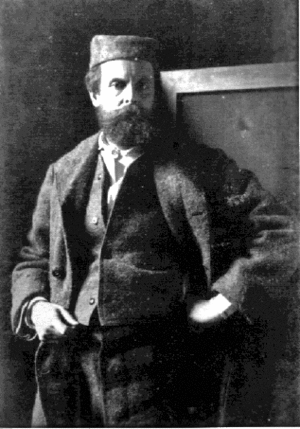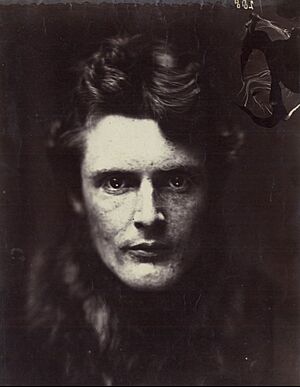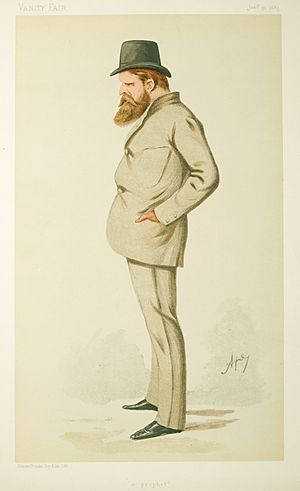Wilfrid Scawen Blunt facts for kids
Quick facts for kids
Wilfrid Scawen Blunt
|
|
|---|---|

Wilfrid Scawen Blunt
|
|
| Born | 17 August 1840 Petworth, Sussex, England
|
| Died | 10 September 1922 (aged 82) England
|
| Occupation | Poet, essayist |
| Known for | Poetry, political activist, adventurer, Arabian horse breeder |
| Spouse(s) | Anne Blunt, 15th Baroness Wentworth (m. 1869; died 1917) |
| Children | Judith Blunt-Lytton, 16th Baroness Wentworth |
Wilfrid Scawen Blunt (born August 17, 1840 – died September 10, 1922) was an English poet and writer. He is sometimes known as Wilfred. He and his wife, Lady Anne Blunt, traveled a lot in the Middle East. They were very important in saving the special bloodlines of Arabian horses through their farm, the Crabbet Arabian Stud. Wilfrid Blunt was famous for his poems, which were collected in a book in 1914. He also wrote essays about politics. He was known for being strongly against countries taking over and ruling other countries, which was called anti-imperialism. This idea was not common at the time.
Contents
Early Life and Education
Wilfrid Blunt was born at Petworth House in Sussex, England. This was the home of his aunt's husband, Baron Leconfield. His parents were Francis Scawen Blunt and Mary Chandler. Wilfrid was raised in the Catholic faith, like his mother. He went to school at Twyford School, Stonyhurst, and St Mary's College, Oscott. From 1858 to 1869, he worked for the government in other countries as part of the Diplomatic Service. He was a cousin of Lord Alfred Douglas.
Family and Travels
In 1869, Wilfrid Blunt married Lady Anne Noel. She was the daughter of the Earl of Lovelace and Ada Lovelace, and the granddaughter of Lord Byron.
Wilfrid and Lady Anne traveled widely together. They visited Spain, Algeria, Egypt, the Syrian Desert, and many other places in the Middle East and India. During their travels, they bought many pure-blooded Arabian horses from Egypt and the Nejd. They used these horses to start their own horse farm, the Crabbet Arabian Stud. Later, they bought another property near Cairo, Egypt, called Sheykh Obeyd. This place helped them continue their horse breeding work in Egypt.
Wilfrid and Lady Anne had one child who grew up, Judith Blunt-Lytton, 16th Baroness Wentworth. She later became known as Lady Wentworth. She moved to the Crabbet Park Estate in 1904. Lady Anne and Wilfrid separated in 1906. Lady Anne continued to manage the Crabbet Park property and half of the horses.
Political Views and Activism
Wilfrid Blunt was a strong believer in anti-imperialism. This meant he was against powerful countries controlling weaker ones. He supported the idea of "Egypt for the Egyptians." In 1882, he spoke up for Urabi Pasha, an Egyptian leader. Because of this, Blunt was not allowed to visit Egypt for four years.
He also supported Ireland's independence from Britain. In 1888, he was even put in prison for leading a meeting in Ireland that the government had banned. He was held in Galway Prison and then in Kilmainham Gaol in Dublin.
Blunt wrote about his anti-imperialist ideas in his poetry. In his poem Satan Absolved (1899), he wrote a famous line: "The white man's burden, Lord, is the burden of his cash." This line meant that he believed powerful countries were interested in making money from other lands, not truly helping the people there.
Work in Africa and Writings
In the early 1880s, Britain was increasing its power in Egypt. In 1881, Wilfrid Blunt visited Cairo by chance. He met Sheikh al Jasraji, who was close to Ahmed 'Urabi. Blunt then met his friend Malet, who was the British Consul General. Blunt tried to help by sharing information between the Egyptian leaders and the British.
In December 1881, Blunt met with 'Urabi, who was very popular with Egyptians. 'Urabi explained his nationalist movement, which was called "Egypt for the Egyptians." This movement wanted Egyptians to rule their own country. Blunt felt that the British officials were not truly listening to the Egyptian people.
After a conflict, Blunt was banned from Egypt, and 'Urabi was sent away to Ceylon. Wilfrid Blunt continued to be strongly against colonial expansion in Africa. He wrote several books about his views, including:
- The Secret History of the English Occupation of Egypt... (1907)
- Gordon at Khartoum (1911)
- My Diaries: Being a Personal Narrative of Events, 1888–1914 (2 volumes, 1919–1920)
Wilfrid Blunt was also a friend of Winston Churchill. He helped Churchill write a book about his father, Lord Randolph Churchill.
Images for kids
See also
 In Spanish: Wilfrid Scawen Blunt para niños
In Spanish: Wilfrid Scawen Blunt para niños
 | Bessie Coleman |
 | Spann Watson |
 | Jill E. Brown |
 | Sherman W. White |





